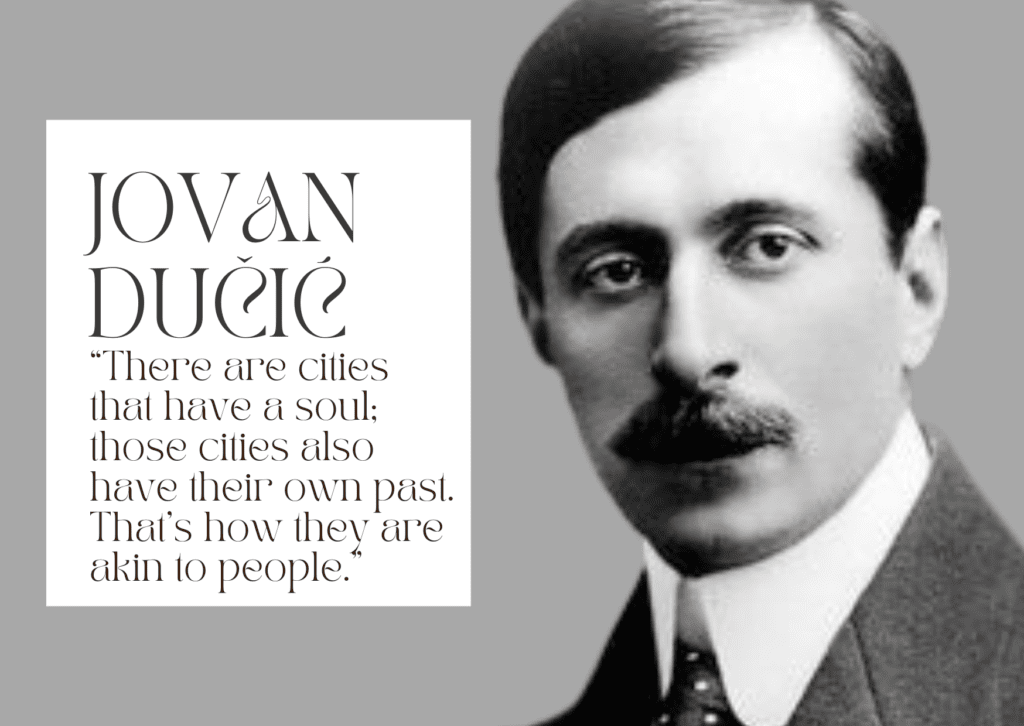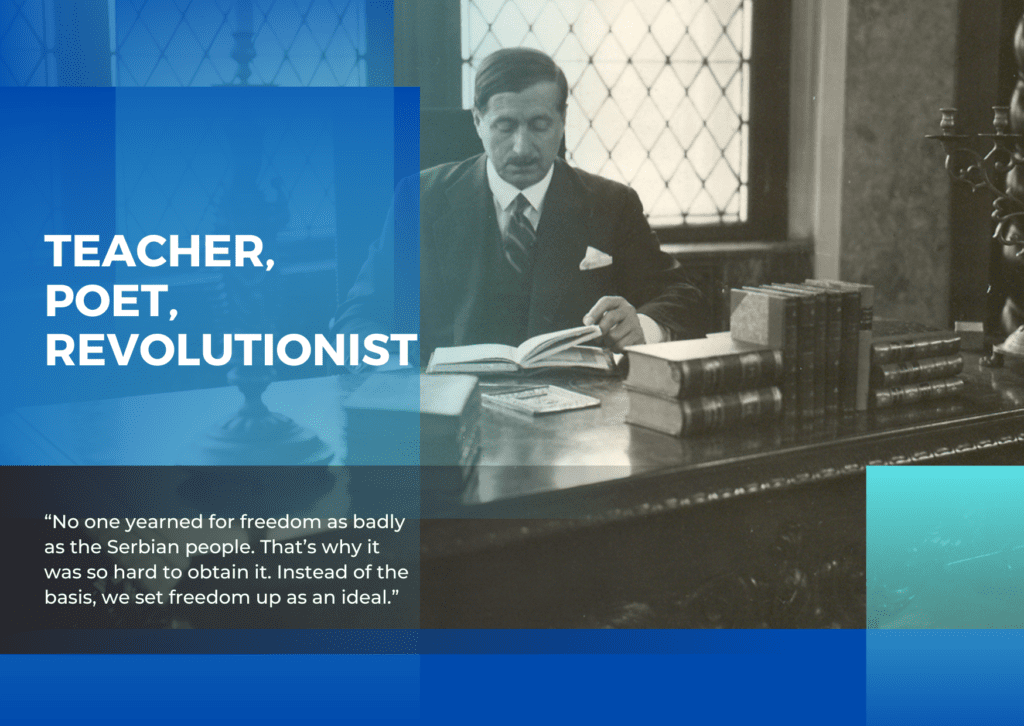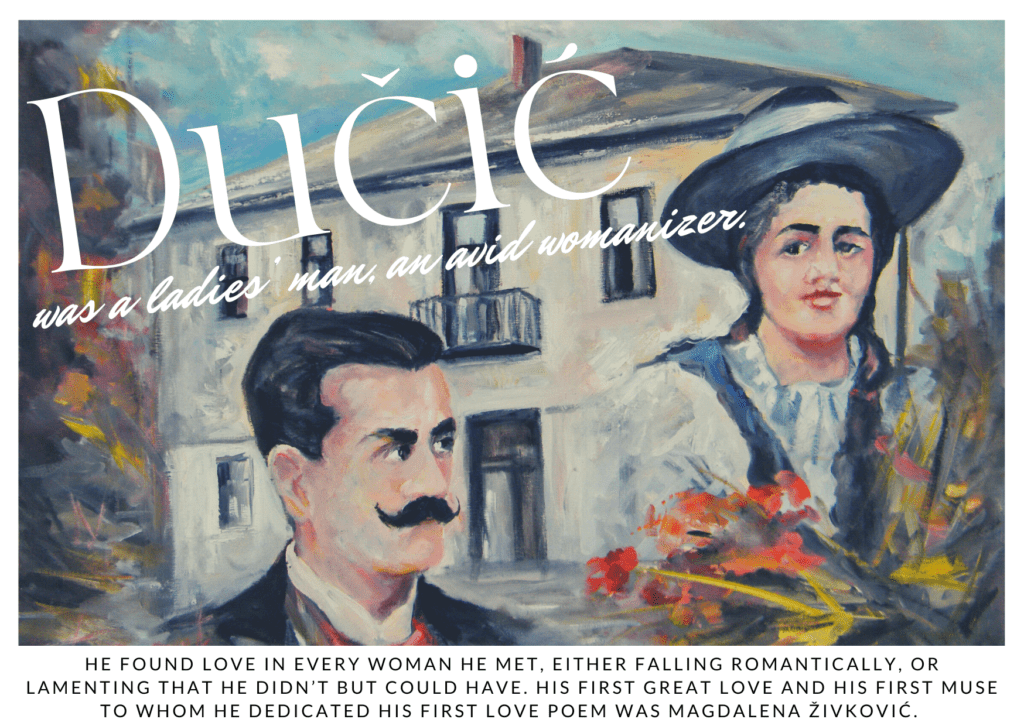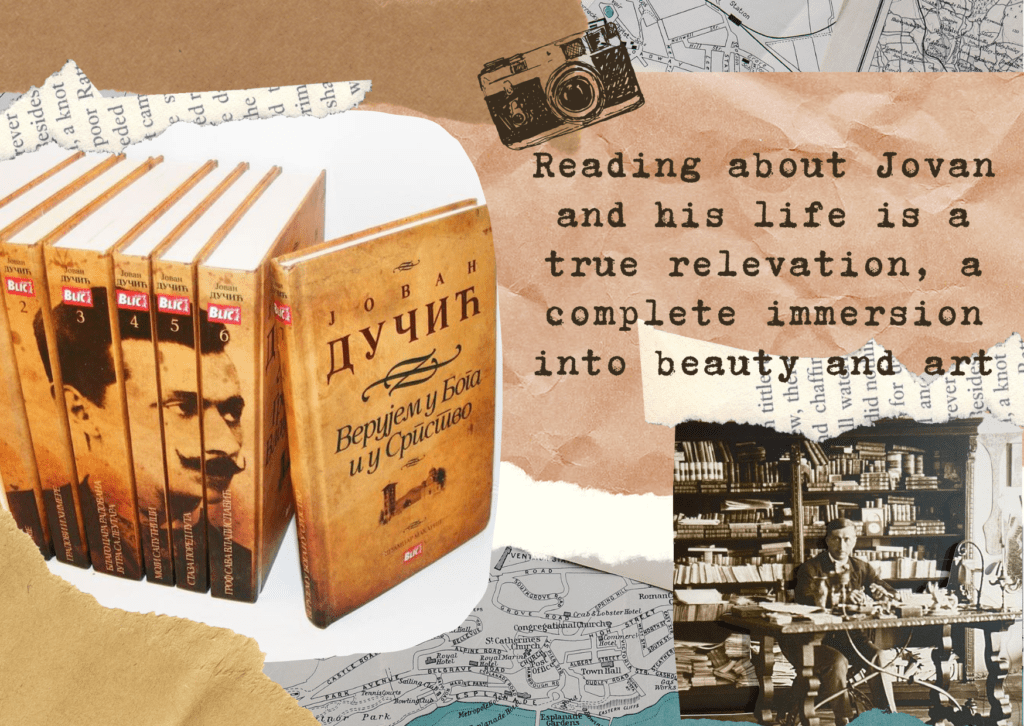“There are cities that have a soul; those cities also have their own past. That’s how they are akin to people.”
Jovan Dučić

The life of Jovan Dučić, one of the most talented and prominent Serbian poets, is a blend of art, love, diplomacy, and politics. It was during his diplomatic posts across Europe and the Middle East that he assembled and published his first book of travelog, Cities and Chimeras.
The book is not a travelog in the traditional sense of the genre. Dučić colors the places he visits in a thousand nuances, capturing their essence and spirit. Even if you’ve never walked the ancient streets of Rome, ambled along the Seine or the banks of Lake Geneva, the descriptive language and the subjective feeling make you feel like a long-lost inhabitant.
The period Jovan Dučić lived in was an equally exciting and terrifying time to be alive: he walked the same cobblestones as Branislav Nušić and Milan Rakić, breathed the same air as famous Serbian revolutionists and commanders, and participated in the liberation of his homeland from foreign oppressors. A nation-defining moment to create in, taking the destiny of Serbia into his own hands.
Teacher, poet, revolutionist

“No one yearned for freedom as badly as the Serbian people. That’s why it was so hard to obtain it. Instead of the basis, we set freedom up as an ideal.”
Jovan Dučić (1874-1943) was the most important Serbian modernist poet, writer, and critic of his own time. The early 20th century was truly a tumultuous age in Europe, especially on the Balkan peninsula. Dučić was born in Trebinje, in Bosnia and Herzegovina, the part of Serbian territory that was under the rule of the Austro-Hungarian Empire. It was this complex political and national dispute that shaped his mind and cemented his allegiance to the Serbian people.
Before becoming a poet and founding a literary magazine, Dučić worked as a teacher. Due to his public support of revolutionary ideas that Bosnia would some day soon be free of oppression, he was forbidden to teach. Instead of faltering, this great Serbian man went to Geneva to study, and then to Paris, and came back bolder with more important ideas to share.
If anyone harbored any doubt of whether Dučić was a true Serb, his own life was a testimony of how spectacularly Serbian and Herzegovinian he was. He never ceased to show great strength of character and exceptionally (in)famous Serbian spite. Dučić firmly believed in himself, even when no one else did, that he would become one of the greatest poets not only of Serbia but of Europe. He became a man to whom people were readily approaching, shaking hands, and congratulating on his work and undying love for freedom. He was not a soldier, a fighter with swords and firearms; Jovan Dučić fought with his words, his heart, and a bagful of good old Serbian spite.
During his diplomatic posts, Duka would drink wine. Yet as soon as he would cross the borders of his homeland, he would switch to rakija. If that’s not a true patriot, I don’t know what is.
In Chimera’s Blood: A Novel about Dučić, a spectacular romanticized biography about the great Serbian poet, Slaviša Pavlović reveals a somewhat arrogant and vengeful side of Dučić. All those who spoke against him as he was on his way up, every publisher’s rejection, all the wrongs committed by the Austro-Hungarian government against him and his people, Dučić saw as an encouragement. He was thriving from the social, national, and personal injustice, patiently waiting for strategic moments to collect their debts.
Jovan Dučić does not forget!, Pavlović mentions. He does not forgive people of simple mind and no spirit. Their job was to attack men like him, and his was to defeat them. That truly is the fate of both small and great people.
He educated himself, became a citizen of the world and a great poet not to surrender to the system but to change it. He may not have had three dragons like Daenerys Targaryen, but he sure fought hard to break the wheel.
Cities and Chimeras

His travelog was written between 1900 and 1940, first published in 1930. As a diplomat, Dučić was stationed in several countries, in some of which he served as the ambassador. The book was conceptualized in the form of letters with no recipients. In these profoundly deep and honest correspondence with his readers, Dučić reflected on God, religion, love, architecture, literature, philosophy, and comparisons between nations he visited during his travels.
His fascination with cultures permeates his work. He loved some cities, abhorred others, but whatever he felt, his shrewd eye and skillful hand immortalized it for generations to come. His insightful conclusions and comparisons were authentic a hundred years ago, and if you read Cities and Chimeras today, you’ll see how accurate they still are. He didn’t write only about places, restaurants, fountains, and landscapes; Jovan Dučić communicated ideas, sentiments, and delightful idiosyncrasies of nations. The truth is that Jovan Dučić was an exceptionally talented and astute man, which made him an even greater poet. He perfectly captured the qualities and flaws of every English gentleman, Bulgarian tradesman, Greek traveler, German professor, and Russian philosopher.
Dučić takes your hand gently, like a lover, and commences a journey across time and space, letting you in on secrets of each causeway you pass together, of each rock that witnessed antique, each palace that housed kings and princesses. He acts like a tourist guide, or that annoying uncle that keeps on talking without being asked. But as soon as he opens his mouth, you’ll never want his clever comparisons to end.
Nights in Spain fall quickly, he will tell you, heavily, as if the dark was never to be lifted again. Palaces in Toledo resemble tombstones at night; the dark casts its shadows over monasteries and shelters creating deep abysses, and something cold crawls up a man’s body if he hesitates to cross the intersection.
Jerusalem is frozen in time. Every road, stone and pebble, every wheat of grass still blessed by stillness and excitement of something holy that happened thousands of years ago. Christ dusted his footwear on those dirt roads. In Jerusalem, everything is an allusion, a symbol, and a warning.
Nights in Rome begin with such a radiancy that would typically illuminate dawns in any other city. In Rome every building leans on another, older one; an ancient Roman bath was turned into a medieval church, and the medieval church leans on an English hotel. Buildings in Rome are given new lives with the same old rocks and stones that once fortified the ancient foundations.
“The woman and the sea! Two elements that built this world.”
—Jovan Dučić
“God is one truth of the hearth. That’s why he can’t be killed by reason because He wasn’t made by reason; the thought of God will disappear among men only when their hearts fall low. Faith, that’s nothing but sentimentalism. There is no idea of God but rather a feeling, a fantasy of God. That’s why women are great keepers of the faith, they are sentimental, they have heart and imagination.”
Dučić was a ladies’ man, an avid womanizer. He found love in every woman he met, either falling romantically, or lamenting that he didn’t but could have. His first great love and his first muse to whom he dedicated his first love poem was Magdalena Živković. They were betrothed to be married, but her family didn’t want a poor teacher for their Maga. Serbian spite worked its charm, and Jovan Dučić left Trebinje and Bosnia to pursue dreams and prominent careers.
His literary work is divided into poems of love, longing, and passion, and those of freedom and patriotism. The reason he started writing journals in the form of letters was heartbreak, not from Maga but from a Polish woman with whom he shared a passionate vacation in the Alps. His short flings added to his character and solidified his role as a poet, a discoverer of truth and love.
His journals were his hope that someday, another young writer like himself would read about the travels and troubles of a naive Jovan Dučić, follow in his footsteps as he uncovers the majestic places of the earth and great disappointments of love.
His first love and fiance never married. Magdalena led a solitary life until her death, living through Dučić’s letters and poems. When she died in 1957, her tombstone was engraved with a dedication: Maga Nikolić-Živanović, the poet herself and the first inspiration of Jovan Dučić.

“Duka has forever known that the Serb has a natural tendency to either kill or humiliate his own men of greatness, to glorify them in the decasyllabic quatrain as heroes, and finally to canonize them as holy saints of his church.”
Pavlović’s biography of Jovan Dučić contains letters he wrote during his exile in the US. Following the German occupation of Yugoslavia in 1941, he fled the country, and just like many great Serbian men before him, found refuge in America. He led a Chicago-based organization, the Serbian National Defence Council, founded by another Serbian knight of science, Mihajlo Pupin, avidly propagating the cease of war and informing the public of the atrocities committed in Jasenovac.
By becoming a poet and freedom fighter, Dučić took on himself a great deal of sacrifice – he chose to create in a dark yet equally majestic period of Serbian history. He willingly put himself on a pedestal, lighting the way of all patriots and poets to come, inspiring more glorious talents like Ivo Andrić and Meša Selimović.
Reading Dučić for the first time is a revelation. Reading about him and his life is a true relevation, a complete immersion into beauty and art. Slaviša Pavlović’s narration about Duka is very much needed today, more than ever, and equally needed as any scribbling of Dučić’s pen.
Yu Biblioteka recommends you warm up your chilly winter days with a copy of Cities and Chimeras. After finishing it, you’ll want to know more about the poet’s life, so make sure to get a copy of Chimera’s Blood: A Novel about Dučić by Slaviša Pavlović.
Truly yours,
Vanja
